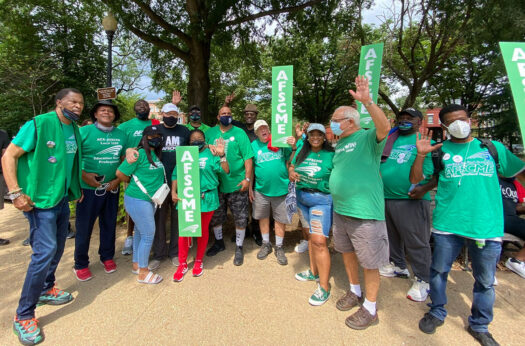
WASHINGTON—Saying voting rights and worker rights are definitely and inextricably linked, advocates, led by the NAACP, the ACLU, and the AFL-CIO, launched a new campaign to pressure lawmakers to approve the John Lewis Act, restoring and enhancing the Voting Rights Act, and the right to vote.
In union-dominated rallies on Aug. 21 in Washington, Cleveland, Detroit, and Milwaukee, speakers pounded home the message again and again that “the sacred right to vote,” as everybody put it, is under attack from white supremacists and right-wingers, fueled by former Oval Office occupant Donald Trump’s big lies.
And the way to blunt that assault, they declared, is to first get the House to pass the John Lewis Voting Rights Advancement Act, which will hit the floor the week of Aug. 23.
Meanwhile, they’ll also pressure senators to break the 50-50 partisan deadlock and a threatened GOP filibuster against the measure, HR4. And if the filibuster remains in the way, they said, get rid of it.
“We are standing up for voting rights. We are standing up against racial discrimination. We are standing up against voter suppression,” new AFL-CIO President Liz Shuler told the crowd of more than 150 people—most of them from AFSCME and the Teachers (AFT)—in a D.C. park 12 blocks from the U.S. Capitol.
“In our House” of Labor, “voting rights and workers’ rights are one. Together we are facing a fundamental assault,” Shuler declared in her first public speech since being elected to succeed the late Richard Trumka.
The white supremacists and their political allies are “trying to take our voting rights away and corporations are trying to take away voting rights at the workplace,” too. “This is not coincidental.”

“We can’t have strong labor rights in this country without strong voting rights,” added AFSCME President Lee Saunders, another D.C. speaker. Of the foes, he commented, “They have to rig the ballot box.”
Recognizing the opposition’s tactics, Shuler vowed “we’re going to sideline the filibuster and pass the John Lewis Voting Rights Act and the Richard Trumka Protect the Right to Organize (PRO) Act.” That measure, the most comprehensive pro-worker labor law rewrite since the original National Labor Relations Act, also faces death by filibuster. It hasn’t been officially renamed for Trumka, yet.
Sponsors of the drive, named FightingForOurVote.org, include the AFL-CIO, the ACLU, the NAACP, the National Education Association, the Teachers, and AFSCME. Other unionists at the rallies included members of the Communications Workers, the Government Employees, the National Writers Union, the Coalition of Labor Union Women, and, in Cleveland, the Teamsters.
Shuler and Saunders weren’t the sole union presidents to urge people to join the campaign, including by calling a toll-free number 855-930-3131. NEA President Becky Pringle spoke in Detroit while Teachers President Randi Weingarten keynoted the Cleveland rally, and Washington Teachers Union President Jacqueline Pogue Lyons also spoke in D.C.
Weingarten was explicit about the linkage to Trump. “You know what’s happening with that Trump Big Lie,” she declared. “It’s fueled 400 bills across the country in 48 states to try to take your vote away…. We are out here fighting for the right to vote because the right to vote is sacred to all of us.” Some 15 GOP-run states already enacted voter suppression laws.
The Lewis Act, named for the late, great, civil rights leader and longtime Democratic congressman from Atlanta, would restore federal power to negate voter suppression measures in states, cities, and other governments with histories of discrimination. It would give the U.S. Justice Department, or federal judges, the power to overrule such measures, by “preclearance,” negating them even before they took effect.
“Today is a day of reckoning for our nation,” said Akosua Ali, president of the NAACP’s D.C. branch. “It’s time to say, ‘enough is enough.’ These are racist policies of Jim Crow that continue to suppress Black people,” she added.
“Nobody should take this right away because of what you look like and how you vote,” added longtime Democratic Party activist Donna Brazile, in the only allusion to the fact that GOP voter suppression deliberately targets not just voters of color but Democratic voters.
Weingarten told the Cleveland crowd the right-wing voter suppression campaign threatens schools and kids, too. She cited its opposition to measures—such as better ventilation, monitoring, masking, vaccinations, and physical distancing—needed to protect kids against community spread of the coronavirus and reopen the nation’s schools. That’s in addition to its opposition to federal funds for such measures.
The advocates vowed an all-out campaign to get lawmakers to pass the Lewis Act but did not reveal details yet of what’s next, other than the website and toll-free phone number. Interviewed afterwards, since he specifically mentioned mobilizing legions of door-to-door campaigners, Saunders said, “We’re going to be educating and organizing and mobilizing all across the country for the year.
“We want the John Lewis Act. We want drop boxes” for ballots “available everywhere. We want mail-in voting and at least two weeks of early voting in every state. And we want protection for poll workers” against right-wing intimidation and threats, now legalized by many of the state-level GOP-passed voter repression laws.
“Labor alone has 10 million people we can put on the street,” Saunders said.
Find out more at FightingForOurVote.org.












Comments